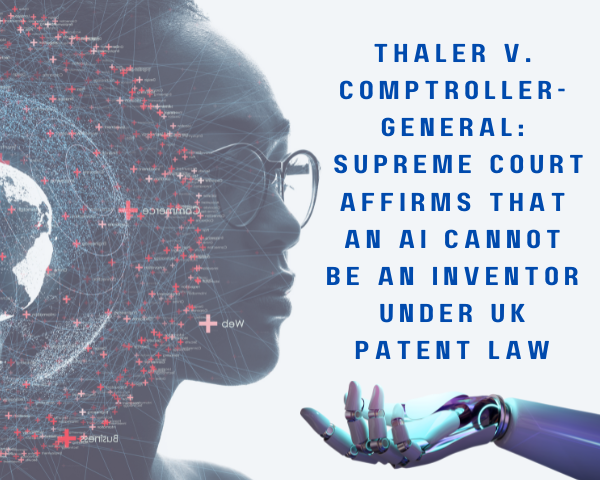The field of Artificial Intelligence (AI) is fast evolving and discovering new applications on a regular basis. It is still rethinking how to approach and solve challenges in a wide range of sectors. Artificial intelligence (“AI”) advancements in this Fourth Industrial Revolution period have resulted in AI capable of developing innovative and inventive inventions. The question then becomes whether these AI-generated inventions are patentable under present patent law.
In our previous blog post, we explained how the EPO released its judgment outlining the reasons for the rejection of two European patent applications in which an AI system was named as the inventor. The EPO denied the applications EP 18 275 163 and EP 18 275 174, which were filed by an individual in 2018.
Following that, the applicant Stephen Thaler, who has been trying to get patents all over the world for inventions made by his AI machine called DABUS — Device for Autonomous Bootstrapping of Unified Sentience — that did not require human intervention, filed an appeal to the decision at the European Patent Office (EPO), to which the board said on 21.12.2021 that only humans can be listed as inventors on patents, effectively dismissing the applicant who is trying to get an artificial intelligence machine named on patents.
BACKGROUND
In the cases J 8/20 and J 9/20, the question arose as to whether an applicant for a European patent can name an artificial intelligence machine that lacks legal standing as an inventor. In a number of jurisdictions, including the European Patent Office, applications were filed designating the AI system DABUS as the inventor, with the petitioner claiming that DABUS created the inventions entirely on its own.
The designation of the inventor is a formal requirement of the European Patent Convention (EPC) that a patent application must comply with according to Article 81 EPC and Rule 19(1) EPC. This formal condition is assessed prior to and separate from the substantive examination, and there is no evaluation of whether the subject matter of the application fits the patentability standards.
Both applications were denied by the EPO’s Receiving Section. For two reasons, it deemed the applicant’s designation to be incompatible with Article 81 EPC in its decisions.
1. It came to the conclusion that only a human inventor could be considered an inventor under the EPC. As a result, naming the machine as an inventor did not meet the standards of Article 81 and Rule 19(1) of the EPC.
2. According to the Receiving Section, a machine cannot transfer any rights to the applicant.
As a result, the Receiving Section determined that the applicant’s claim that they were a successor in the title since they owned the machine did not satisfy the requirements of Article 81 EPC in connection with Article 60(1) EPC.
Further, Thaler has had patents naming DABUS as an inventor denied in Europe, the United Kingdom, and the United States — by both a Virginia federal judge and the United States Patent and Trademark.
The EPO denied two of Thaler’s applications in December 2019, following a hearing in which the office made its conclusion after only 21 minutes of deliberation, according to the minutes. Thaler had also requested that the inventor part be kept blank, with the human who invented DABUS named as the patent owner instead, but the agency denied it because a machine cannot transfer patent rights. The board upheld both of those decisions and dismissed Thaler’s appeal.




